Key takeaways:
- Effective communication and clear protocols are essential for smooth stage operations, ensuring all team members are aligned during productions.
- Organizational skills, problem-solving ability, and emotional intelligence are critical for stage managers to navigate challenges and support the team.
- Utilizing the right tools and time management techniques enhances efficiency, allowing stage managers to focus on creativity and storytelling without logistical distractions.
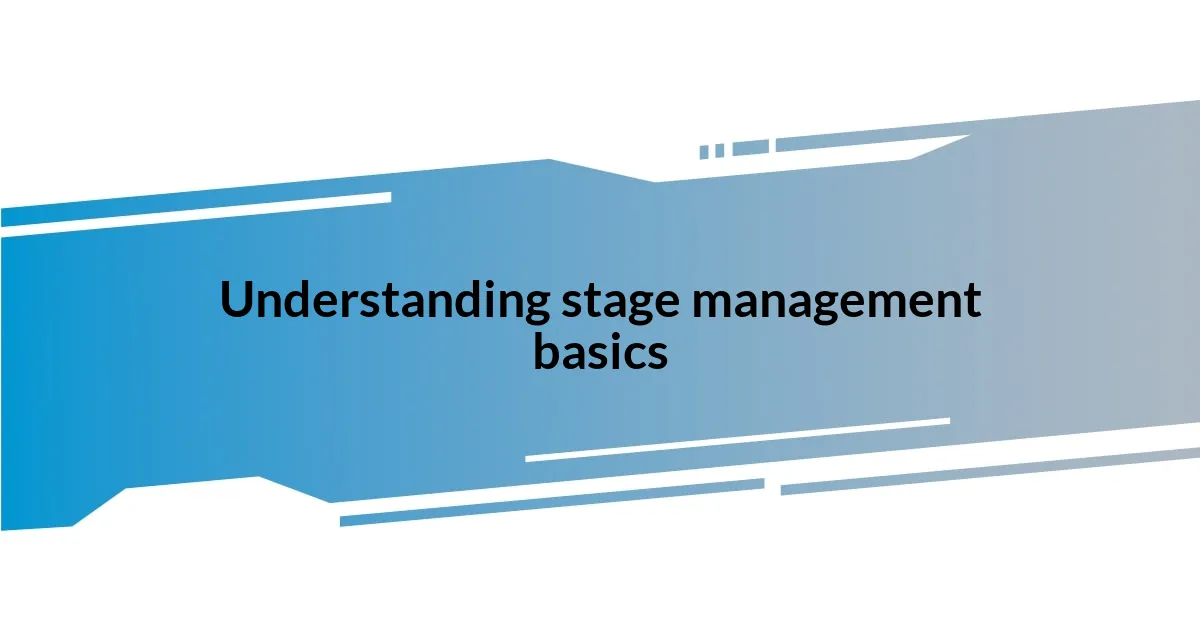
Understanding stage management basics
At its core, stage management is about orchestrating the countless moving parts of a production to ensure everything runs smoothly. I remember my first time as a stage manager; I was a bundle of nerves, surrounded by actors with scripts in hand and a tight schedule looming. It’s incredible how each cue, whether it’s lighting or sound, becomes a lifeline that keeps the performance from veering off course.
One key aspect of stage management that often gets overlooked is the importance of communication. I learned the hard way that clear and concise communication can be a game changer during frantic moments on set. Have you ever wondered how a seemingly chaotic scene can unfold without a hitch? It all boils down to the stage manager’s ability to relay messages effectively between the cast and crew, keeping everyone on the same page.
Moreover, understanding the technical aspects, like lighting and sound design, is crucial. My early experiences taught me that when I grasped how each component worked, I became not only a manager but a partner to the designers. This synergy not only boosts the confidence of the team but enhances the overall quality of the production. Isn’t it fascinating how knowledge in these areas can transform a stage manager from an overseer into a vital collaborator?
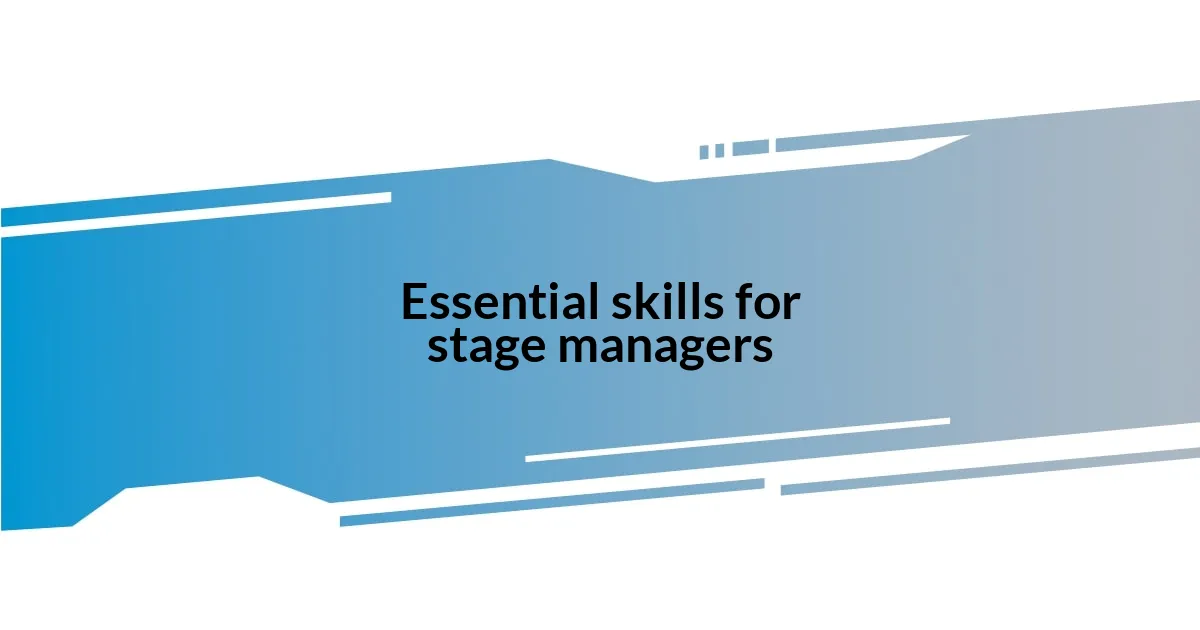
Essential skills for stage managers
Stage management requires a blend of organizational skills and intuition. I found that being detail-oriented kept me one step ahead, especially during tech rehearsals when everything can feel like a whirlwind. The ability to prioritize tasks and anticipate the needs of each department is essential. I’ve often thought of stage managers as the unsung heroes of the production, wearing multiple hats while ensuring that everyone has what they need to succeed.
Another vital skill is problem-solving. During a show, unforeseen challenges can arise at any moment, like an actor forgetting their lines or a prop going missing. I recall once during a live performance when the lead actor tripped and fell off the stage, and I had to quickly decide whether to call for a break or keep going. My gut told me to keep the show alive, and it turned into one of those magical moments that the audience still talks about. Being adaptable in such situations is a skill that never fails to serve me well.
Lastly, emotional intelligence plays a significant role in stage management. Understanding the dynamics of the team can help in navigating conflicts and boosting morale. I’ve experienced how a simple acknowledgement of someone’s hard work can uplift spirits, especially during the taxing weeks leading up to a show. It’s rewarding to create an environment where everyone feels valued and invested in the production’s success.
| Essential Skills | Description |
|---|---|
| Organization | Keeping track of all moving parts and prioritizing tasks effectively. |
| Problem-Solving | Quickly addressing unforeseen challenges that arise during rehearsals and performances. |
| Emotional Intelligence | Understanding team dynamics and providing support to enhance morale and collaboration. |
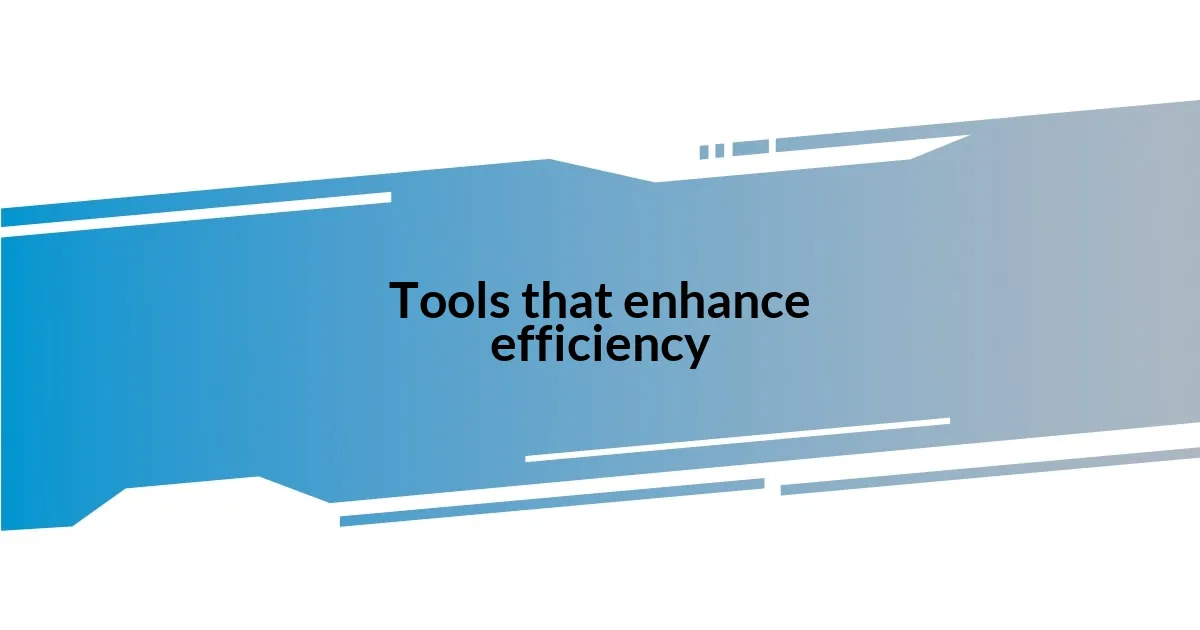
Tools that enhance efficiency
Enhancing efficiency in stage management relies heavily on the right tools. When I first started managing productions, I quickly realized that a well-organized digital platform could easily save me hours of work. Using software that consolidates schedules, cues, and checklists into one accessible location not only streamlined my workflow but also allowed the entire team to stay updated in real-time. There was a moment during a particularly hectic production week when a scheduling conflict arose, and thanks to the software, I was able to coordinate adjustments on the fly without losing precious time.
Here are some tools I’ve found to be invaluable:
- Production Management Software: Programs like Asana or Trello help keep everyone accountable and on track.
- Cue Tracking Apps: Tools such as QLab make it easier to cue lights and sounds, reducing the margin for error during complex scenes.
- Communication Platforms: Slack or WhatsApp can facilitate quick updates and instant discussions among cast and crew.
- Digital Prop and Costume Lists: Creating shared documents enhances transparency and ensures nothing gets overlooked.
From my experience, investing in the right combination of tools significantly enhances not just my efficiency but also the overall team’s performance. After implementing these tools in one production, I felt a noticeable shift. The entire team was more collaborative and informed, which allowed us to focus on the art of storytelling rather than getting bogged down by logistical obstacles.
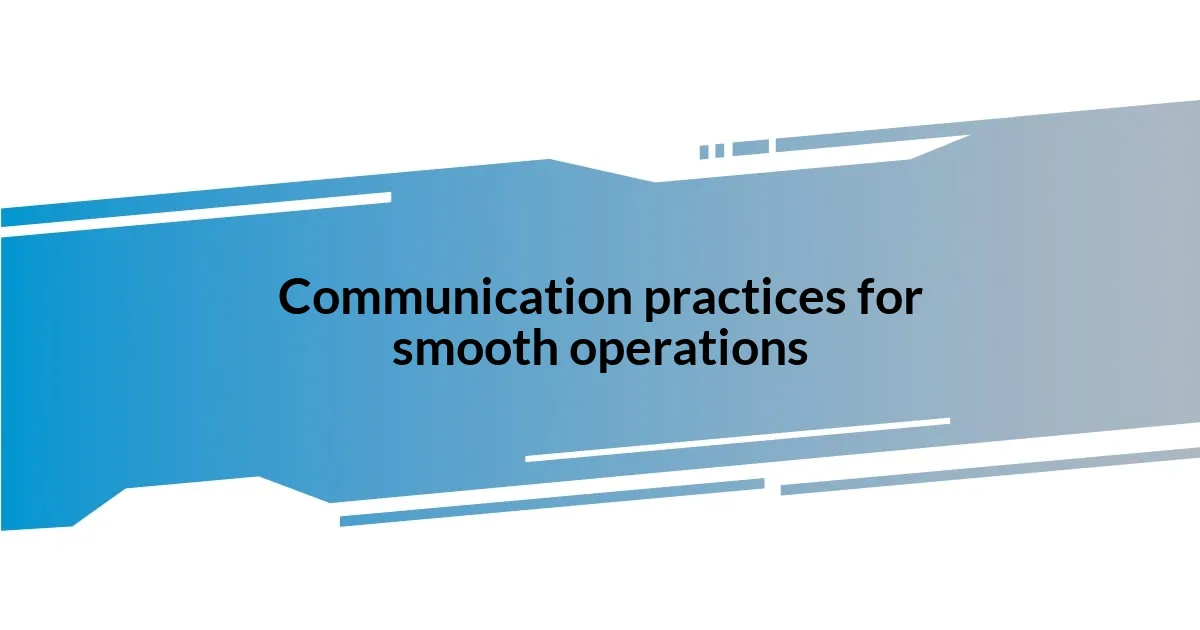
Communication practices for smooth operations
Effective communication is the backbone of smooth stage operations. I remember one chaotic rehearsal when broken radio communication nearly derailed our progress. That’s when I realized the value of having a designated communication system in place, like clear channels for each department. It’s fascinating how simple protocols can save you from a potential mess. Have you ever experienced a production where unclear communication led to confusion? It can happen quickly!
Daily check-ins became a ritual for my teams. These brief huddles ensure everyone is on the same page and ready to tackle the day’s challenges. I once implemented a “highlight and lowlight” sharing moment where team members could share a win and a struggle. This not only built trust but also fostered a sense of camaraderie. Who doesn’t feel more energized knowing their voice is heard?
I find that using visual aids, like cue sheets and diagrams, can significantly enhance clarity. During a particularly challenging scene change, I introduced a color-coded visual guide that both the crew and actors could refer to. The difference was palpable! It just demonstrated that clear visual communication can ease anxieties and keep everyone focused on their roles. I truly believe that fostering open lines of communication helps nurture an environment where creativity thrives.
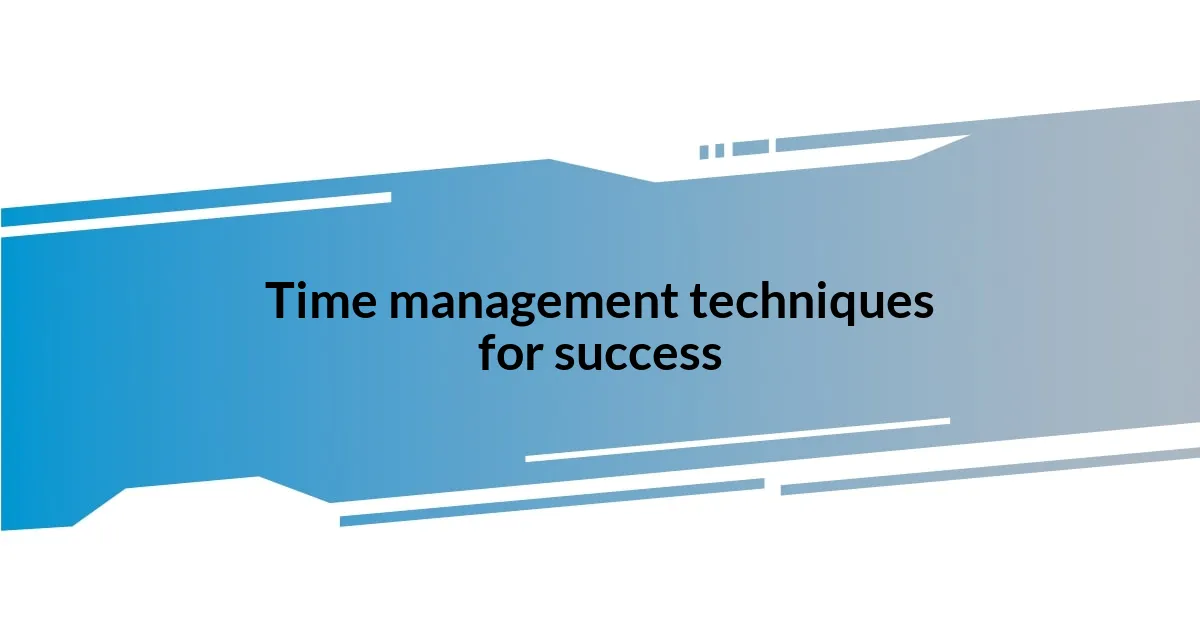
Time management techniques for success
Time management is crucial for success in stage management. I often find myself juggling multiple tasks, and one technique that really helps me is the Pomodoro Technique, where you work for 25 minutes and then take a 5-minute break. This simple method not only keeps my focus sharp but also ensures I take necessary breaks to recharge. It’s amazing how a little structure can dramatically enhance productivity, don’t you think?
An essential aspect of my time management is prioritizing tasks using the Eisenhower Matrix. This method categorizes tasks by urgency and importance, allowing me to focus on what truly matters. I recall a particularly busy day when I was overwhelmed by a long to-do list. By quickly sorting my tasks, I tackled the most critical ones first and felt a sense of accomplishment as I cleared them out. Have you ever felt the satisfaction of crossing items off your list? It’s incredibly motivating!
I also recommend setting clear deadlines for yourself, even for tasks that don’t have external timelines. I like breaking larger projects into smaller, manageable pieces, each with its own deadline. For instance, during a recent production, I broke down the rehearsal schedule, setting daily benchmarks that ensured we stayed on track. This not only eased the stress of last-minute preparations but also fostered a rhythm within the team. Can you see how small adjustments can lead to big improvements in workflow?
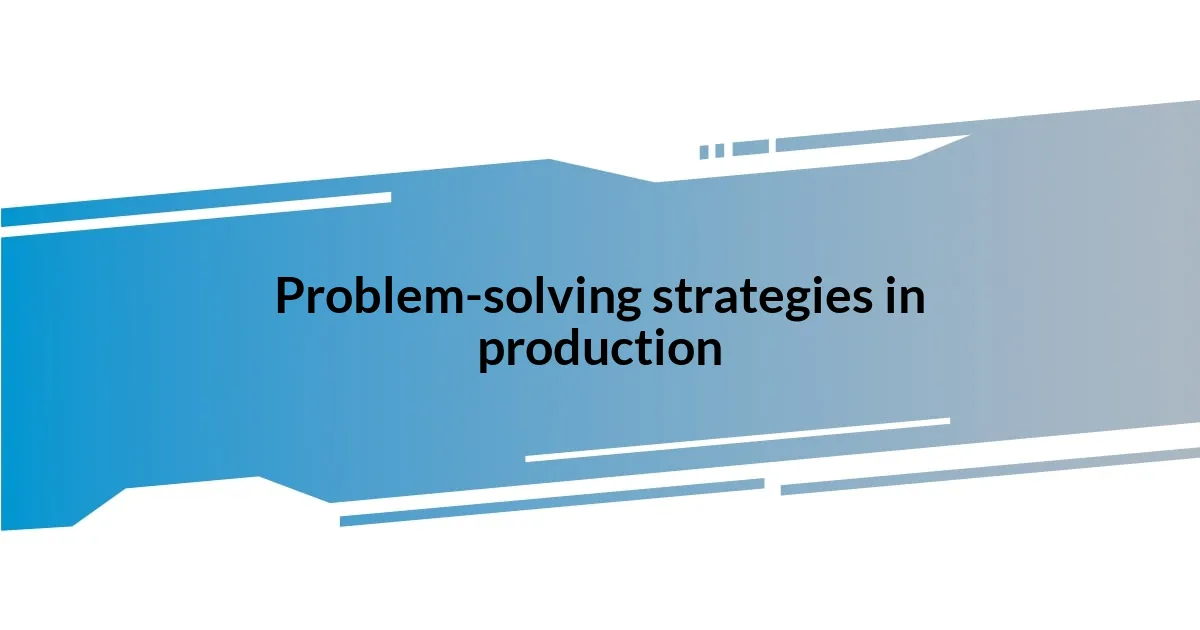
Problem-solving strategies in production
When it comes to problem-solving in production, I always rely on proactive brainstorming sessions. A memorable incident was when we faced an unexpected technical issue during tech week. Our team gathered around, and each member contributed ideas without judgment. It was incredible to witness the creative flow! Have you ever noticed how collaboration can spark solutions that you might not consider on your own? This approach shifts the pressure away and turns problem-solving into a collective effort, making it much more manageable.
On another occasion, I learned the importance of staying calm under pressure. During a live performance, a crucial prop went missing just minutes before the show. I quickly took a deep breath, and instead of panicking, I assessed our options. We used a creative stand-in that worked seamlessly, and the audience never noticed the difference. This taught me that adaptability is key; sometimes, the best solutions come from thinking outside the box. Isn’t it fascinating how embracing uncertainty can lead to unexpected triumphs?
I’ve also found that maintaining a positive mindset significantly affects our problem-solving capabilities. After a particularly tough rehearsal where everything seemed to go wrong, I initiated a “solution wall” where we could post challenges and brainstorm solutions. Just seeing those ideas grow visibly brought a sense of relief and determination to the team. Emphasizing solutions over problems not only uplifts morale but also channels our energy into finding paths forward. Have you experienced the empowerment that comes from focusing on solutions instead of obstacles?
